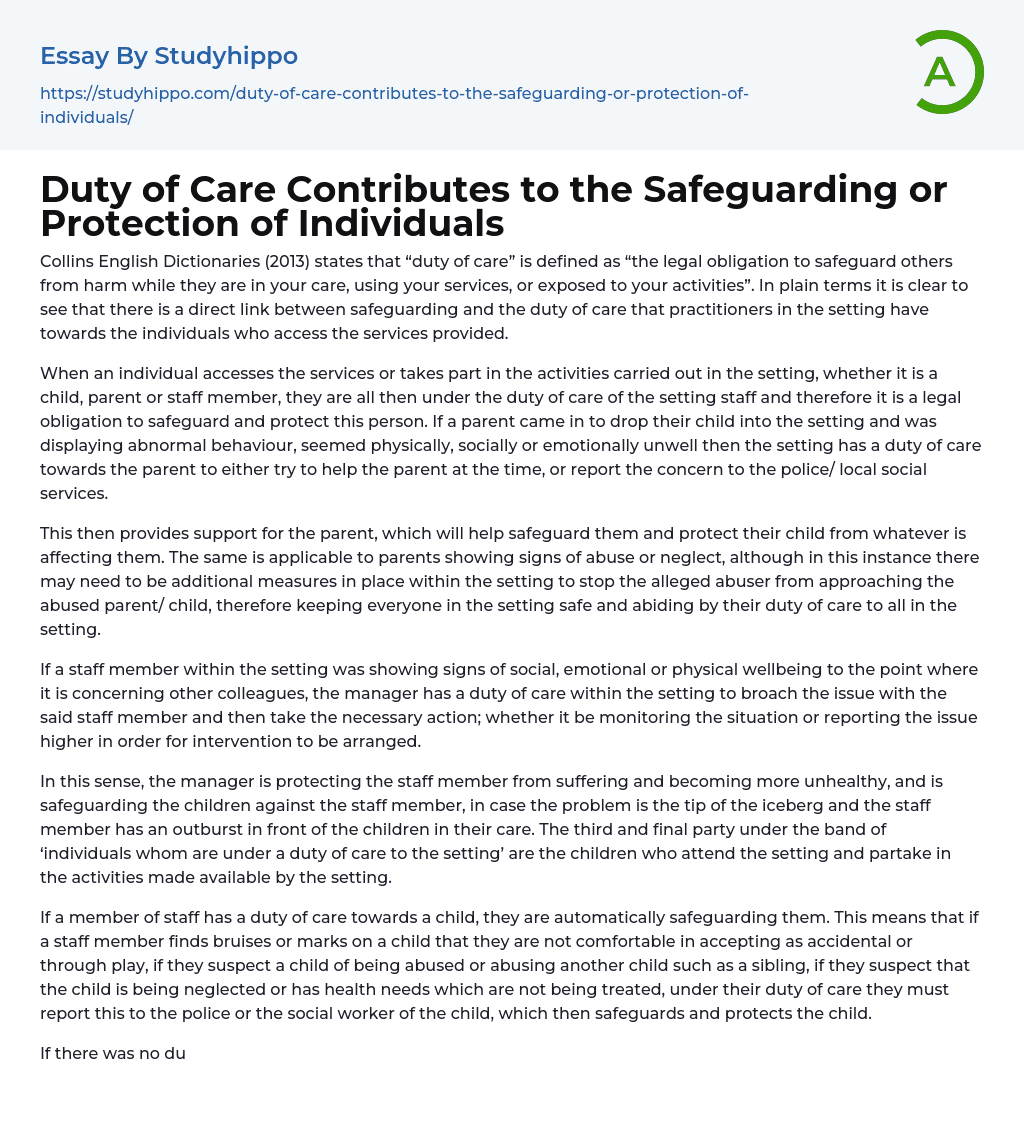

Duty of Care Contributes to the Safeguarding or Protection of Individuals Essay Example
Collins English Dictionaries (2013) states that “duty of care” is defined as “the legal obligation to safeguard others from harm while they are in your care, using your services, or exposed to your activities”. In plain terms it is clear to see that there is a direct link between safeguarding and the duty of care that practitioners in the setting have towards the individuals who access the services provided.
When an individual accesses the services or takes part in the activities carried out in the setting, whether it is a child, parent or staff member, they are all then under the duty of care of the setting staff and therefore it is a legal obligation to safeguard and protect this person. If a parent came in to drop their child into the setting and was displaying abnormal
...behaviour, seemed physically, socially or emotionally unwell then the setting has a duty of care towards the parent to either try to help the parent at the time, or report the concern to the police/ local social services.
This then provides support for the parent, which will help safeguard them and protect their child from whatever is affecting them. The same is applicable to parents showing signs of abuse or neglect, although in this instance there may need to be additional measures in place within the setting to stop the alleged abuser from approaching the abused parent/ child, therefore keeping everyone in the setting safe and abiding by their duty of care to all in the setting.
If a staff member within the setting was showing signs of social, emotional or physical wellbein
to the point where it is concerning other colleagues, the manager has a duty of care within the setting to broach the issue with the said staff member and then take the necessary action; whether it be monitoring the situation or reporting the issue higher in order for intervention to be arranged.
In this sense, the manager is protecting the staff member from suffering and becoming more unhealthy, and is safeguarding the children against the staff member, in case the problem is the tip of the iceberg and the staff member has an outburst in front of the children in their care. The third and final party under the band of ‘individuals whom are under a duty of care to the setting’ are the children who attend the setting and partake in the activities made available by the setting.
If a member of staff has a duty of care towards a child, they are automatically safeguarding them. This means that if a staff member finds bruises or marks on a child that they are not comfortable in accepting as accidental or through play, if they suspect a child of being abused or abusing another child such as a sibling, if they suspect that the child is being neglected or has health needs which are not being treated, under their duty of care they must report this to the police or the social worker of the child, which then safeguards and protects the child.
If there was no duty of care, then the individual could pick and choose when to safeguard the child, but because it is a legally binding term, the practitioner
has no choice but to report the concerns, even if it comes to nothing but the concern is logged in the contact centre.
As well as this, there are some practical parts of the duty of care which safeguard the individuals in the setting naturally such as:
- Risk assessing the indoor and outdoor areas everyday
- Surveying equipment to check it’s safety
- Observing and monitoring children’s individual developmental progress
- Having Safeguard trained staff * Having a SENCO in the setting
- Childhood Memory essays
- Affordable Care Act essays
- Child essays
- Child labor essays
- Childcare essays
- Adolescence essays
- Childhood essays
- Growth Mindset essays
- Individual essays
- Infant essays
- Is Google Making Us Stupid essays
- Career Choice essays
- Career Goals essays
- Career Plan essays
- Community Service essays
- Dream Job essays
- Duty essays
- Employee essays
- Internship essays
- Interview essays
- Job essays
- Job Interview essays
- Performance Appraisal essays
- Portfolio essays
- Service essays
- Skills essays
- Vocation essays
- Work Experience essays
- Work-Life Balance essays
- Adoption essays
- Aunt essays
- Babies essays
- Bedroom essays
- Caring essays
- Children essays
- Daughter essays
- Divorce essays
- Dog essays
- Dysfunctional Family essays
- Family Tradition essays
- Family Values essays
- Father essays
- Foster Care essays
- Friends essays
- Grandparent essays
- Home essays
- Hometown essays
- Husband essays
- Jealousy essays
- Love essays



